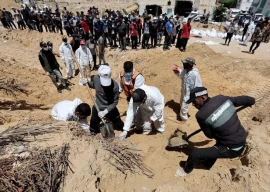
According to a press release issued by the agency here today, 58,000 families in KP districts of Bannu, Lakki Marwat and Karak and FR Bannu in FATA will benefit from this campaign by March 2015.
Francisco Gamarro, deputy FAO representative in Pakistan who has also been a senior emergency coordinator in Pakistan, earlier told The Express Tribune that while comparing the conditions of livestock of previous displacements, the sanitary conditions of those migrating from North Waziristan remain a concern mainly because routine government services remain suspended hence many animals are left unvaccinated. This crisis has also led the agency to procure more vaccination than before.

He said that those animals could be potential carriers of transmittable diseases that can be fatal. Speaking of main risks, he said that IDPs and host communities were vulnerable to Congo Virus, Anthrax and Leishmaniasis-which were transmittable from animals to people. “We are spraying animals with products to prevent the spread of disease” he said.
Assistant Representative FAO Nasar Hayat explained that 60-70% animals while migrating out of North Waziristan walked long distances and such stress causes animals to be more vulnerable to diseases such as Foot and Mouth.
FAO procured 526,000 doses of Foot and Mouth Disease (FMD) vaccines for large ruminants and 178,000 doses of Peste des petits ruminants (PPR) vaccines for goats and sheep. Both diseases are highly contagious and cause large economic losses due to high rates of mortality and morbidity among livestock. The vaccines are administered by veterinary professionals from the Livestock and Dairy Development Directorates General of KP and FATA. The vaccination campaign which started last month will last five months.
According to experts, the estimated count of livestock is lesser after Eid, however many refugees are still living with their animals. Hayat said that the number 174,000 does not cover the entire population of animals, which stands at half a million. The government of KP and FATA were vaccinating on their own.
Gamarro said that while the agency was not capable of supporting everyone, it is prioritising most vulnerable families. He said as winter is approaching there is a dire need to look into feeding and shelter for livestock.
“Livestock is an important source of livelihoods for poor households. It provides milk, eggs, meat and cash when sold. Preserving the lives and health of IDP livestock is a high priority for FAO,” said Patrick T. Evans, FAO representative in Pakistan.
Animals will also receive injectable de-worming medicine – another measure provided by FAO to preserve the health and productivity of the livestock. Along with the vaccines, FAO will provide 10,000 feed packages for animals consisting of compound feed, urea molasse, feeding and water troughs, as well as milking kits.
Published in The Express Tribune, November 11th, 2014.


















1713889672-1/Plastic-waste-(2)1713889672-1-270x192.webp)
























COMMENTS
Comments are moderated and generally will be posted if they are on-topic and not abusive.
For more information, please see our Comments FAQ